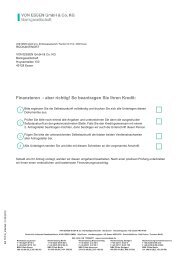2012 Registration document and annual financial report - BNP Paribas
2012 Registration document and annual financial report - BNP Paribas
2012 Registration document and annual financial report - BNP Paribas
- No tags were found...
You also want an ePaper? Increase the reach of your titles
YUMPU automatically turns print PDFs into web optimized ePapers that Google loves.
A RESPONSIBLE BANK: INFORMATION ON <strong>BNP</strong> PARIBAS’ ECONOMIC,SOCIAL, CIVIC AND ENVIRONMENTAL RESPONSIBILITYEnvironmental responsibility: combating climate change7Financing <strong>and</strong> investment policies in sectors withmajor environmental impactsFour historic sector policies implementedSince 2010, the <strong>BNP</strong> <strong>Paribas</strong> Group has published policies for foursectors particularly sensitive on environmental issues: palm oil, paperpulp, nuclear power <strong>and</strong> coal-fired electricity generation. The policies setm<strong>and</strong>atory requirements <strong>and</strong> evaluation criteria for the Group’s financing<strong>and</strong> investment in these sectors. The introduction of these criteria helpsto pinpoint all the risks related to certain transactions, ensuring thatonly responsible projects are selected. These policies apply to all Groupbusinesses, entities <strong>and</strong> subsidiaries around the world. They are published<strong>and</strong> are available on <strong>BNP</strong> <strong>Paribas</strong>’ website.Two new sector policies in <strong>2012</strong><strong>BNP</strong> <strong>Paribas</strong> decided to set out its responsible commitments with regardto two new sectors: non-conventional oil production from oil s<strong>and</strong>s, <strong>and</strong>mining.Training in the implementation of sector policiesThe sector policies concern all the Group’s employees. Since theirpublications in 2010 <strong>and</strong> 2011, they have been the subject of severaltraining campaigns for concerned employees in various countries (riskmanagement, compliance, CSR managers, client relationship managers):more than 1,500 employees were trained in <strong>2012</strong> to identify <strong>and</strong> processsensitive transactions in these sectors. To meet this growing dem<strong>and</strong>for training in all regions of the world, the Group developed an experte-learning training course on sector policies, which is available toall employees. Containing a wealth of information, it helps users tounderst<strong>and</strong> the issues in sensitive sectors, to identify <strong>BNP</strong> <strong>Paribas</strong>’response <strong>and</strong> to know where to obtain information within the Group.Available in seven languages (French, English, Italian, Dutch, Turkish,Polish <strong>and</strong> Ukrainian), the modules are also accessible to visuallyimpaired people or people with reduced mobility.Impact of sector policiesCoal-fired powerIn order to obtain financing from the <strong>BNP</strong> <strong>Paribas</strong> Group, electric powerplants must meet minimum energy efficiency criteria.New power plants that are exclusively coal-fired must employsupercritical technology with a net energy efficiency of at least 43% forprojects in high-income countries <strong>and</strong> at least 38% in other countries.For other projects, the Group will finance only those that have aCO 2intensity of below 550 CO 2/kWh for high-income countries <strong>and</strong>660 CO 2/kWh for other countries.For old coal-fired power plants, the Group will finance upgrading projectsonly if the power plant conforms with the IFC Environmental, Health<strong>and</strong> Safety Guidelines Directives for thermal power plants <strong>and</strong> if theresulting net energy efficiency is 1) at least equal to that required for anew coal-fired power plant <strong>and</strong> 2) increased by at least 10% comparedwith the initial level.Since its coal policy came into force in September 2011, the Grouphas refused to participate in the financing of around ten power plants,representing <strong>annual</strong> CO 2emissions of more than 80 million tonnes,mainly because of the application of the policy’s energy efficiency criteria.Nuclear powerThe nuclear sector policy mainly addresses questions of security, safety<strong>and</strong> protection of people <strong>and</strong> the environment. It consists of m<strong>and</strong>atorycriteria relating to the host country, the track-record of industrialcompanies working on the project <strong>and</strong> the technological characteristicsof the power station itself.To confirm that a nuclear power station project conforms to its policy,<strong>BNP</strong> <strong>Paribas</strong> can rely on on-site audits by independent experts who arein charge of obtaining as detailed <strong>and</strong> reliable as possible information onthe project. The Group asks the client to publish the main conclusions ofsuch expert <strong>report</strong>s. By comparing their conclusions with the criteria inits policy, the Group can then decide whether to participate in the project.The decision-making process is justified <strong>and</strong> completely transparent.Under this policy, <strong>BNP</strong> <strong>Paribas</strong> has not provided financing for any nuclearpower plant since 2006.The nuclear policy is being reviewed on the basis of stress tests conductedin various countries, drawing on the lessons of the Fukushima accident.Palm oil <strong>and</strong> paper pulpThese two policies contain precise environmental criteria. Projectfinancing in these sectors is, for example, dependent on the followingrequirements:■ not convert UNESCO World heritage sites or sites in the Ramsar List ofWetl<strong>and</strong>s of International Importance into plantations;■ not transform high conservation value forests (HCVFs) into plantations;■ establish a no-burn policy;■ establish precise <strong>and</strong> strict peatl<strong>and</strong> management procedures to bedrawn up before exploiting any new plantation.For the palm oil sector, <strong>BNP</strong> <strong>Paribas</strong>, a member of the Roundtable onSustainable Palm Oil (RSPO) since 2011, encourages industrial companiesto join this initiative (or equivalent). Under the sector policy, producersmust undertake to achieve RSPO certification before 2015, whileprocessors, traders <strong>and</strong> refiners must set up policies that require theirsuppliers either 1) to be RSPO-certified by 2015 or 2) to establish thetraceability of their oil supply sources.The Group regularly enters into dialogue with its clients to encouragethem to commit to improving their environmental performance. Thisconstructive approach, based on a precise study of their practices <strong>and</strong>action plans, is producing promising results. <strong>BNP</strong> <strong>Paribas</strong> has successfullyconcluded several deals in Asia with new clients active in palm oilproduction, while guaranteeing the sustainability of these new clients’activities.7<strong>2012</strong> <strong>Registration</strong> <strong>document</strong> <strong>and</strong> <strong>annual</strong> <strong>financial</strong> <strong>report</strong> - <strong>BNP</strong> PARIBAS 415





